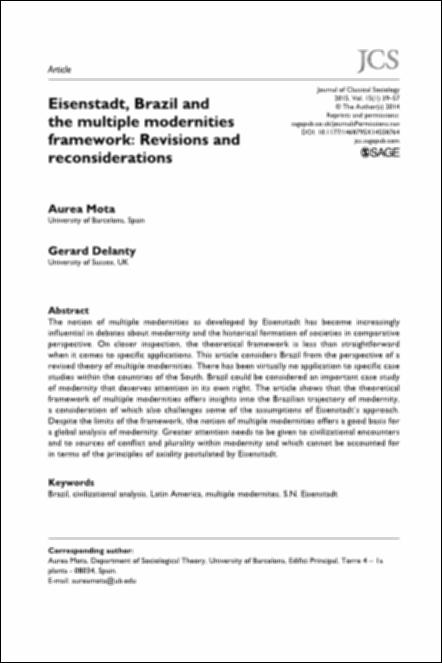Please use this identifier to cite or link to this item:
http://hdl.handle.net/10637/15278Eisenstadt, Brazil and the Multiple Modernities Framework: revisions and reconsiderations
| Title: | Eisenstadt, Brazil and the Multiple Modernities Framework: revisions and reconsiderations |
| Authors : | Mota, Aurea Delanty, Gerard |
| Keywords: | Brasil.; Eisenstadt; Modernidad. |
| Publisher: | Journal of Classical Sociology |
| Citation: | A. Mota and G. Delanty (2014) ‘Eisenstadt, Brazil and the Multiple Modernities Framework: revisions and reconsiderations’, Journal of Classical Sociology, vol. 57 (15 - 2), pp. 39-57. https://doi.org/10.1177/1468795X14558764 |
| Abstract: | The notion of multiple modernities as developed by Eisenstadt has become increasingly influential in debates about modernity and the historical formation of societies in comparative perspective. On closer inspection, the theoretical framework is less than straightforward when it comes to specific applications. This article considers Brazil from the perspective of a revised theory of multiple modernities. There has been virtually no application to specific case studies within the countries of the South. Brazil could be considered an important case study of modernity that deserves attention in its own right. The article shows that the theoretical framework of multiple modernities offers insights into the Brazilian trajectory of modernity, a consideration of which also challenges some of the assumptions of Eisenstadt’s approach. Despite the limits of the framework, the notion of multiple modernities offers a good basis for a global analysis of modernity. Greater attention needs to be given to civilizational encounters and to sources of conflict and plurality within modernity and which cannot be accounted for in terms of the principles of axiality postulated by Eisenstadt. |
| URI: | http://hdl.handle.net/10637/15278 |
| Issue Date: | 4-Dec-2014 |
| Center : | Universitat Abat Oliba CEU |
| Appears in Collections: | Documents de recerca |
Items in DSpace are protected by copyright, with all rights reserved, unless otherwise indicated.


